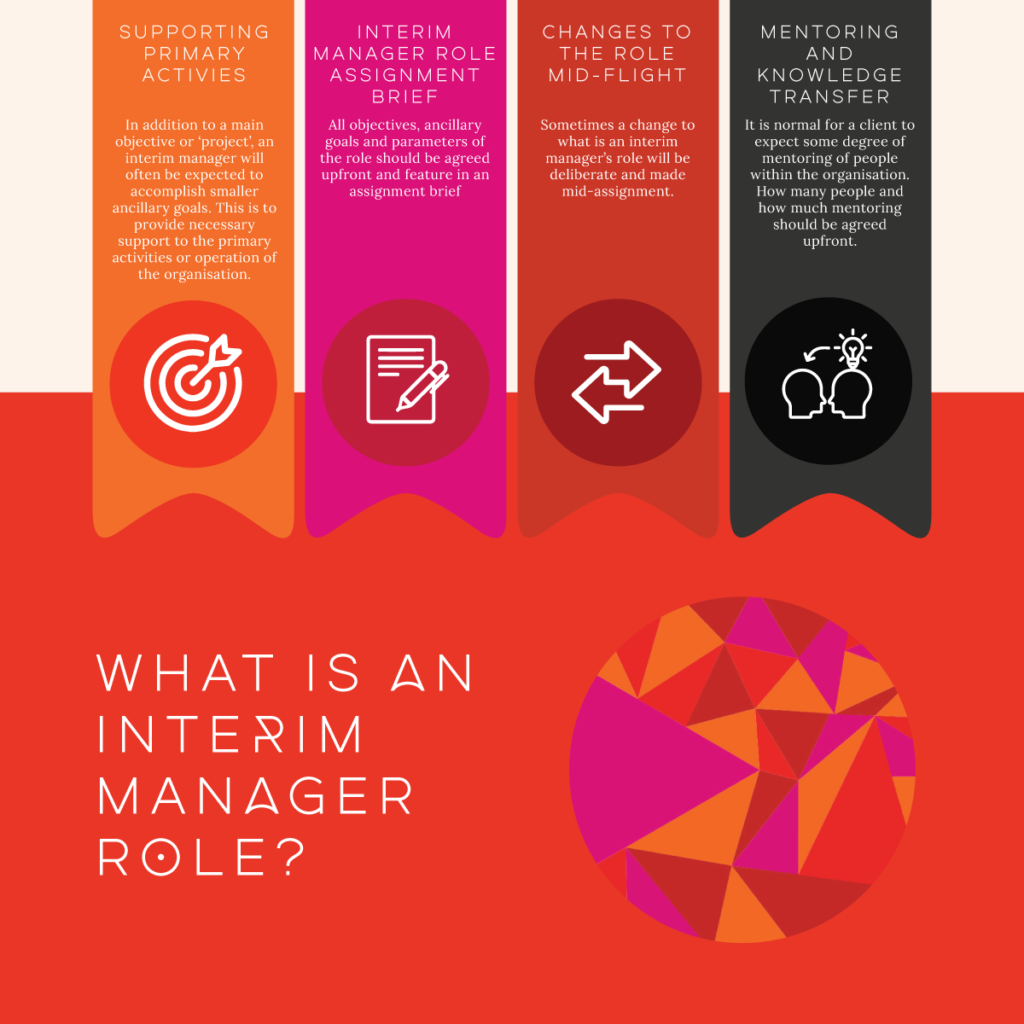What is an interim manager role?

‘What is an interim manager role’ is a commonly asked question
What is an interim manager role? The role takes the form of an assignment with a particular business goal and timeframe for its completion. It is approached with a project mindset of ‘I am here to accomplish these things by this date.’
Often it is misconstrued as covering a gap created in the organisation. However, this is more usually achieved with a fixed-term contractor.
Even on the occasions when an interim manager is engaged following a departure, there will still be important business objectives. These will always be time-limited and specific to the challenges the organisation is facing at that time.
But that’s not all…
“Unlike other types of contract role, all these goals will involve managing people or a project. At the very least, they will deal in some way with the challenges of managing the business.”

Supporting primary activities
In addition to a main objective or ‘project’, an interim manager will often be expected to accomplish smaller ancillary goals. This is to provide necessary support to the primary activities or operation of the organisation.
Unlike other types of contract role, all these goals will involve managing people or a project. At the very least, they will deal in some way with the challenges of managing the business. Naturally, they will be within the experience and expertise of the interim.
For example, an interim HR Director engaged to lead a cultural transformation may also be expected to take on other tasks such as the resolution of a backlog of grievances. Or, mentoring members of the HR team in their roles.
This is one of the things that makes an interim manager’s role different to that of a regular contractor or independent consultant.
Interim manager role assignment brief
All objectives, ancillary goals and parameters of the role should be agreed upfront and feature in an assignment brief. The assignment brief should be the distillation of what is an interim manager role specific to the particular set of circumstances.
Any issues or disagreement with the scope will need to be discussed and agreed in advance of the work starting. For this reason, it’s important that the brief is a true reflection of the situation and demands of the role.
However, this is complicated. An interim manager’s role is often to resolve ‘soft’ problems1.
By their very nature, these kinds of problem mean they are poorly understood in the client organisation. They are typically not well defined and can contain significant unknowns. There can also be important differences of opinion among stakeholders as to the cause, nature and remedy of the problem.
As you might expect, the organisation needs an interim because of a deficit expertise in the area. This can extend to understanding the problem to begin with.
Disambiguating role scope
It is very easy for these issues of ambiguity or clashing perspectives to pollute the assignment brief. It can sometimes give a misleading idea of what is an interim manager’s role.
Typically when this happens, the brief is compiled by a person who is too close to the problem to challenge, unpack and clarify it. And certainly, they will not be doing this from an interim manager’s uniquely-qualified perspective – with the particular things they want to know put first and foremost.
For this reason, an interim manager is wise to make best use of the interview and other contact opportunities to dig beneath the surface. Even so, this can be awkward when you are trying to win the work and do not wish to appear dismissive of what your prospective client is telling you.
This is one of the reasons why it really helps to have an interim management provider2. They will work on everyone’s behalf to clarify, challenge and document the brief, as well as ask additional relevant questions.
Providers can also supplement the information available to the interim from their length of experience with the client.
Inevitably, though, no amount of thorough research and vetting will completely eliminate the possibility of an important discrepancy emerging. Consequently, while the risk can be lowered, the question will eventually become: what to do about it?
“It is not an unreasonable expectation for an interim manager to be flexible… But it’s a question of ‘How flexible?'”
Dealing with discrepancies : what is and what is not the interim manager’s role?
It is not an unreasonable expectation for an interim manager to be flexible. Interims by the nature of their roles require the experience behind them to face uncertainty and unforeseen challenges with confidence. (see our page interim management skills needed.)
But it’s a question of ‘How flexible?’ Significant changes in the goals or a substantial misrepresentation of the situation on the ground is likely to raise problems.
If a major discrepancy with the brief emerges, it is important the issue is addressed immediately. In particular, anything that either jeopardises the client’s expectations or compromises the interim’s ability to deliver the assignment.
Often this can be resolved easily. Expectations can be managed, goals refined, solutions put in place to deal with any disparity and so on. But again, it helps to have an interim provider or agency who can help and intercede with these issues.
Mismanaged role expectations
Perhaps the most emotionally-charged issues emerge when an interim accepts a lower day rate because of the perceived ease or convenience of an assignment. This will be based on the brief they have been given and the expectations set by the provider and client.
If facts on the ground mean it will be just as demanding as higher-paying assignments, they will feel cheated. And, if brought up, the client may feel like the interim is negotiating after the fact from a position of bad faith.
Experienced providers will go to great lengths to avoid this state of affairs occurring. It’s why they put so much effort into setting out and agreeing expectations with both the client and candidate upfront.
However, in rare situations it does occur. Ultimately, it helps to have someone who can mediate. It also helps to keep a record of all communications for clarifying matters. Your provider should also be doing this for all the parties involved.
Unanticipated changes to the role mid-flight
Sometimes a change to what is an interim manager’s role will be deliberate and made mid-assignment. An issue will arise for the organisation unexpectedly. Given the interim’s expertise, they may be looked to for its resolution.
Whether it can be accomplished within the confines of the current assignment will very much depend on the size of the challenge. Typically, interim managers are expected to be overqualified so it may well be something they can deliver as added value.
However, if it cannot be comfortably fitted alongside existing work, the interim may agree to change the assignment. This may mean increasing the days per week, putting an extension in place or revising the main objectives.
This was very common during the COVID-19 pandemic when the priorities for many businesses and organsiations changed seemingly overnight. The interim HR Director overseeing the culture change referenced earlier was then tasked with reviewing policies around homeworking instead to ensure the organisation could be effective during lockdowns.
Perhaps the simplest way to encapsulate it is, “The role of an interim manager is to make themselves unnecessary… and then move on.”
The interim manager’s role in Mentoring and Knowledge Transfer
It would be incomplete to cover ‘What is an interim manager role?’ without looking at expectations around mentoring and knowledge transfer. It is normal for a client to expect some degree of mentoring of people within the organisation.
How many people and how much mentoring should be agreed upfront. As a rule of thumb, the base expectation is that when the interim leaves, the organisation will be better positioned to deal with similar issues again should they arise.
For this reason, it is absolutely an expectation that important knowledge generated within the assignment is transferred. Interim’s are not anticipated to keep intellectual property generated on the client’s behalf to themselves. This is one of the major differences with management consultancy.
Ultimately, there are many aspects to an interim assignment but perhaps the simplest way to encapsulate it is, “The role of an interim manager is to make themselves unnecessary… and then move on to the next client.”
Get in touch

Sam Hawkins
Director
More about interim managers
Interim managers have been a growing presence in the workplace since the 1970s. Now worth over £1bn, the market for interim managers is dynamic, constantly evolving and changing. If you want to know more about interim management, we have further resources on the following pages:
- What is an interim manager?
- What benefits interim manager?
- Interim manager meaning
- Executive interim management
- ROI of an interim manager
- Interim Management Client Guide
- Interim Management Candidate Guide
- Interim management in a time of COVID-19
- IR35, what it means for Interim Managers
- What is the institute of interim management
See our interim jobs page.
About Practicus
You can find out more about us on the about us page.
References
- Soft vs. Hard Problems, John Schuyler, Mar 1998, maxvalue.com.
- The Institute of Interim Management
